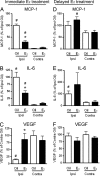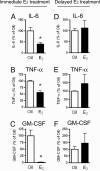Timing of estrogen therapy after ovariectomy dictates the efficacy of its neuroprotective and antiinflammatory actions
- PMID: 17389368
- PMCID: PMC1851608
- DOI: 10.1073/pnas.0610394104
Timing of estrogen therapy after ovariectomy dictates the efficacy of its neuroprotective and antiinflammatory actions
Abstract
Recent studies describing the seemingly contradictory actions of estrogens in ischemic stroke injury have led us to reevaluate the circumstances under which estrogen therapy (ET) provides benefits against cerebral stroke and decipher its mechanisms of action. One prominent feature that follows stroke injury is massive central and peripheral inflammatory responses. Evidence now suggests that postischemic inflammatory responses strongly contribute to the extent of brain injury, and 17beta-estradiol (E(2)) may protect the ischemic brain by exerting antiinflammatory actions. In an attempt to explain recently reported dichotomous effects of E(2) in stroke injury, we tested the hypothesis that an extended period of hypoestrogenicity both prevents E(2) from protecting the brain against ischemia and simultaneously suppresses its antiinflammatory actions. We report that E(2) exerts profound neuroprotective action when administered immediately upon ovariectomy, but not when administered after 10 weeks of hypoestrogenicity. Consistently, E(2) treatment given immediately at the time of ovariectomy attenuated central and peripheral production of proinflammatory cytokines after ischemic stroke. In contrast, E(2) did not suppress production of proinflammatory molecules when it was administered after 10 weeks postovariectomy. These results demonstrate that a prolonged period of hypoestrogenicity disrupts both neuroprotective and antiinflammatory actions of E(2). Our findings may help to explain the results of the Women's Health initiative that reported no beneficial effect of ET against stroke because the majority of the subjects initiated ET after an extended period of hypoestrogenicity.
Conflict of interest statement
The authors declare no conflict of interest.
Figures




Similar articles
-
The loss of estrogen efficacy against cerebral ischemia in aged postmenopausal female mice.Neurosci Lett. 2014 Jan 13;558:115-9. doi: 10.1016/j.neulet.2013.11.007. Epub 2013 Nov 15. Neurosci Lett. 2014. PMID: 24246902
-
Estradiol enhances neurogenesis following ischemic stroke through estrogen receptors alpha and beta.J Comp Neurol. 2007 Feb 20;500(6):1064-75. doi: 10.1002/cne.21240. J Comp Neurol. 2007. PMID: 17183542
-
Different methods for administering 17beta-estradiol to ovariectomized rats result in opposite effects on ischemic brain damage.BMC Neurosci. 2010 Mar 17;11:39. doi: 10.1186/1471-2202-11-39. BMC Neurosci. 2010. PMID: 20236508 Free PMC article.
-
Neuroprotective effects of estrogens following ischemic stroke.Front Neuroendocrinol. 2009 Jul;30(2):201-11. doi: 10.1016/j.yfrne.2009.04.007. Epub 2009 May 3. Front Neuroendocrinol. 2009. PMID: 19401209 Free PMC article. Review.
-
Estradiol is a protective factor in the adult and aging brain: understanding of mechanisms derived from in vivo and in vitro studies.Brain Res Brain Res Rev. 2001 Nov;37(1-3):313-9. doi: 10.1016/s0165-0173(01)00136-9. Brain Res Brain Res Rev. 2001. PMID: 11744096 Review.
Cited by
-
Interactions between age, sex, and hormones in experimental ischemic stroke.Neurochem Int. 2012 Dec;61(8):1255-65. doi: 10.1016/j.neuint.2012.10.003. Epub 2012 Oct 13. Neurochem Int. 2012. PMID: 23068990 Free PMC article. Review.
-
Revisiting the timing hypothesis: biomarkers that define the therapeutic window of estrogen for stroke.Horm Behav. 2013 Feb;63(2):222-30. doi: 10.1016/j.yhbeh.2012.06.002. Epub 2012 Jun 19. Horm Behav. 2013. PMID: 22728278 Free PMC article. Review.
-
Benefits of estrogen replacement for skeletal muscle mass and function in post-menopausal females: evidence from human and animal studies.Eurasian J Med. 2011 Aug;43(2):109-14. doi: 10.5152/eajm.2011.24. Eurasian J Med. 2011. PMID: 25610174 Free PMC article. Review.
-
Impact of aging vs. estrogen loss on cardiac gene expression: estrogen replacement and inflammation.Physiol Genomics. 2011 Sep 22;43(18):1065-73. doi: 10.1152/physiolgenomics.00228.2010. Epub 2011 Jul 12. Physiol Genomics. 2011. PMID: 21750230 Free PMC article.
-
Sex differences in stroke: the contribution of coagulation.Exp Neurol. 2014 Sep;259:16-27. doi: 10.1016/j.expneurol.2014.02.011. Epub 2014 Feb 19. Exp Neurol. 2014. PMID: 24560819 Free PMC article. Review.
References
Publication types
MeSH terms
Substances
Grants and funding
LinkOut - more resources
Full Text Sources

